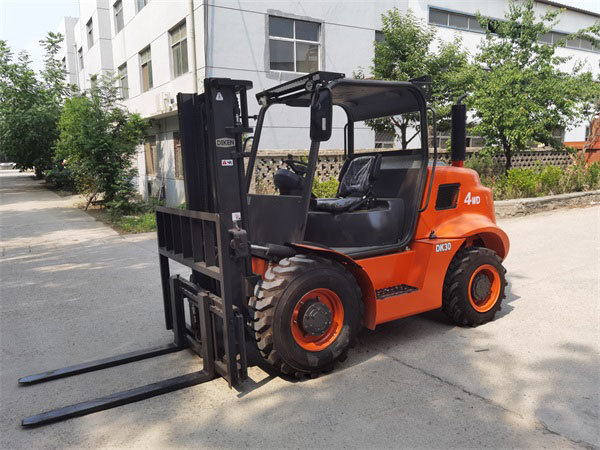Diken news
Exploring the Power and Versatility of Off Road Forklifts
Release time: 2025-04-02
Off road forklifts are specialized vehicles designed to operate in rugged and uneven terrains where standard forklifts may struggle. These robust machines are equipped with features that allow them to traverse challenging landscapes, making them ideal for applications in industries such as automotive, particularly in the realm of off-road vehicles.
One of the key characteristics of off road forklifts is their enhanced traction. Unlike standard forklifts, these vehicles typically come with wider tires and rugged tread patterns that provide superior grip on loose or unstable surfaces, such as mud, gravel, or sand. This traction is crucial for operators who need to move heavy loads in outdoor environments where conventional forklifts would be ineffective.
Another important feature of off road forklifts is their elevated ground clearance. This design allows them to navigate over obstacles such as rocks, tree roots, and uneven ground without damaging the vehicle or its cargo. Many models also come with reinforced frames that can withstand the stresses of off-road operation, ensuring durability and longevity in demanding settings.
In terms of functionality, off road forklifts are incredibly versatile. They can be used for various tasks, from loading and unloading vehicles to transporting parts and equipment across job sites. This versatility makes them a valuable asset in automotive manufacturing plants, construction sites, and even agricultural settings, where traditional forklifts may not be able to perform effectively.
Safety is another critical consideration when operating off road forklifts. Many models are equipped with advanced safety features, such as stability systems to prevent tipping and roll-over protection. Additionally, operators are encouraged to undergo proper training to understand the unique challenges presented by off-road environments, ensuring both the safety of the operator and the integrity of the cargo.
Maintenance of off road forklifts also requires attention to detail, as the harsh conditions they operate in can lead to increased wear and tear. Regular inspections and servicing are essential to keep these machines in optimal working condition. Operators should pay special attention to tire wear, hydraulic systems, and engine performance, as these components are critical to the functionality and safety of the vehicle.
In summary, off road forklifts provide unmatched capabilities for handling heavy loads in challenging environments, particularly in the automotive industry focused on off-road vehicle production. Their unique design features, including enhanced traction, elevated ground clearance, and robust safety systems, make them indispensable tools for companies that require reliable performance in rugged terrains. Understanding how to effectively utilize and maintain these machines can significantly improve operational efficiency and safety on job sites.
One of the key characteristics of off road forklifts is their enhanced traction. Unlike standard forklifts, these vehicles typically come with wider tires and rugged tread patterns that provide superior grip on loose or unstable surfaces, such as mud, gravel, or sand. This traction is crucial for operators who need to move heavy loads in outdoor environments where conventional forklifts would be ineffective.
Another important feature of off road forklifts is their elevated ground clearance. This design allows them to navigate over obstacles such as rocks, tree roots, and uneven ground without damaging the vehicle or its cargo. Many models also come with reinforced frames that can withstand the stresses of off-road operation, ensuring durability and longevity in demanding settings.
In terms of functionality, off road forklifts are incredibly versatile. They can be used for various tasks, from loading and unloading vehicles to transporting parts and equipment across job sites. This versatility makes them a valuable asset in automotive manufacturing plants, construction sites, and even agricultural settings, where traditional forklifts may not be able to perform effectively.
Safety is another critical consideration when operating off road forklifts. Many models are equipped with advanced safety features, such as stability systems to prevent tipping and roll-over protection. Additionally, operators are encouraged to undergo proper training to understand the unique challenges presented by off-road environments, ensuring both the safety of the operator and the integrity of the cargo.
Maintenance of off road forklifts also requires attention to detail, as the harsh conditions they operate in can lead to increased wear and tear. Regular inspections and servicing are essential to keep these machines in optimal working condition. Operators should pay special attention to tire wear, hydraulic systems, and engine performance, as these components are critical to the functionality and safety of the vehicle.
In summary, off road forklifts provide unmatched capabilities for handling heavy loads in challenging environments, particularly in the automotive industry focused on off-road vehicle production. Their unique design features, including enhanced traction, elevated ground clearance, and robust safety systems, make them indispensable tools for companies that require reliable performance in rugged terrains. Understanding how to effectively utilize and maintain these machines can significantly improve operational efficiency and safety on job sites.
Keywords: off road forklift










